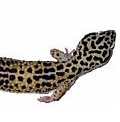A major factor in enjoying a healthy, active and happy gecko is providing it with a good healthy diet. Leopard Geckos are insectivores, like many other reptilian creatures, which means that they feed on insects, such as spiders, moths, mosquitoes, and worms.
Two appropriately sized mealworms for every inch of a leopard gecko's full length is all that's required, but you can treat your pet to waxworms or superworms once a week. They should be given live insects that are small enough for the gecko to handle.
In general adult geckos can be fed every other day while baby leopard geckos should be fed daily. You can adjust the feeding to suit your specific gecko's needs if this schedule doesn't seem to work for your pet.
You can also feed your gecko crickets, but when giving a gecko crickets as prey, you need to make sure that you use crickets that are small enough for your gecko to hunt.
A large cricket in comparison to the size of your gecko will not only prove to be a stressful challenge for your pet, but the gecko may also end-up being injured by the oversized cricket.
You can offer your gecko anywhere from 4 to 8 crickets at one time. If the crickets aren't eaten within a couple of hours they should be removed and used for the next feeding, so that they don't cause your gecko any unnecessary stress. It is normal for geckos to eat the skin that they shed, so they may not always need the same amount of food for each feeding.
Mealworms, super-worms or anything else that can be contained in a dish can be left within the cage for your pet to eat as required.
As a treat you can give your adult gecko an occasional tiny pinkie mouse. One that is only a few days old will be small enough for a fully grown gecko to deal with. In fact, pinkie mice are a fantastic choice to give breeding females.
Wax-worms are also a good occasional treat for your gecko. Even though geckos love wax-worms, they are very fattening and generally unhealthy for geckos.
To keep your gecko from choking, the prey that you give your pet should be no larger than half the width of your gecko's head.
The skin that the gecko sheds, and then eats, does help to provide them with protein and other healthy nutrients.
Another way of keeping your leopard gecko healthy in regards to feeding it, is to gut-load the prey 24 hours prior to feeding it to your gecko. Gut-loading is feeding the crickets or other insects a very nutritious, high quality meal before feeding them to your gecko. Chick or hog mash can be used to feed the insects or you can use things like fruits, vegetables and grains.
You can also purchase a powdered supplement from a pet store for the purpose of gut-loading the prey. Along with gut-loading, you can offer your gecko calcium and vitamin supplements by sprinkling the prey with powdered supplements prior to feeding them to your gecko.
Calcium and vitamins are very important to the overall health of the leopard gecko. When dusting the prey, you do want to be careful not to get dust in your gecko's eyes.
Providing extra powdered calcium is also needed to enrich the diet of baby leopard geckos and breeding females.
Your gecko should also have fresh water available at all times. Stagnant water is a breeding ground for bacteria which can lead to illness in your gecko so the water should be changed regularly.
